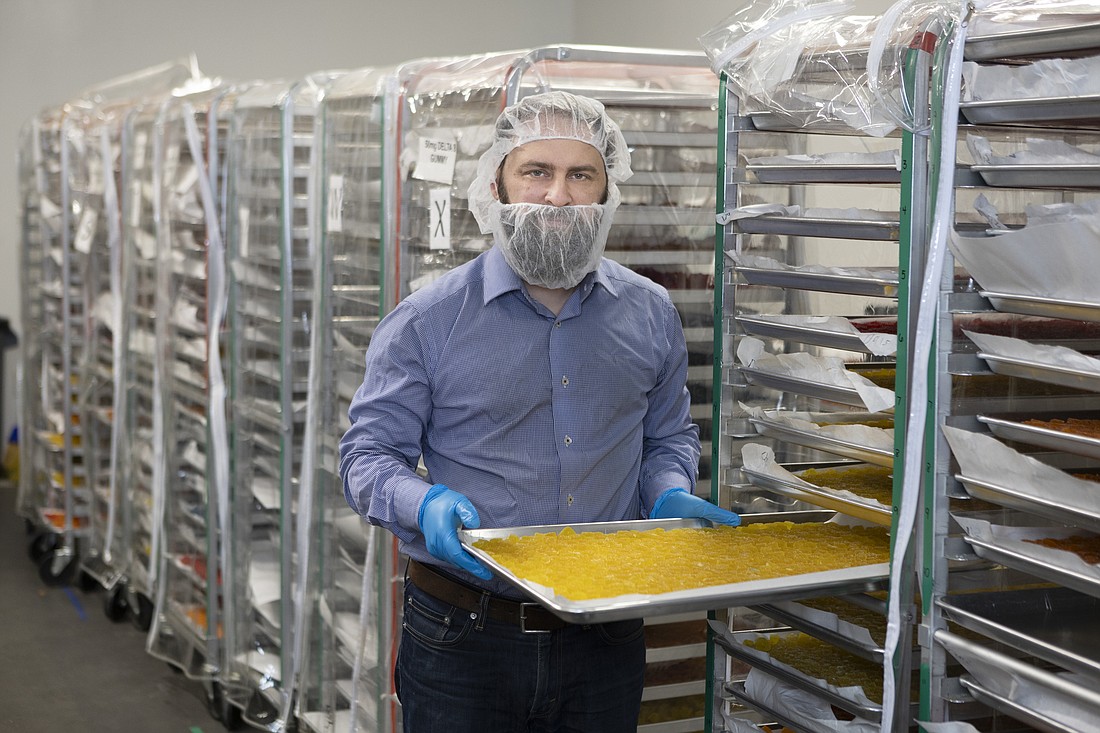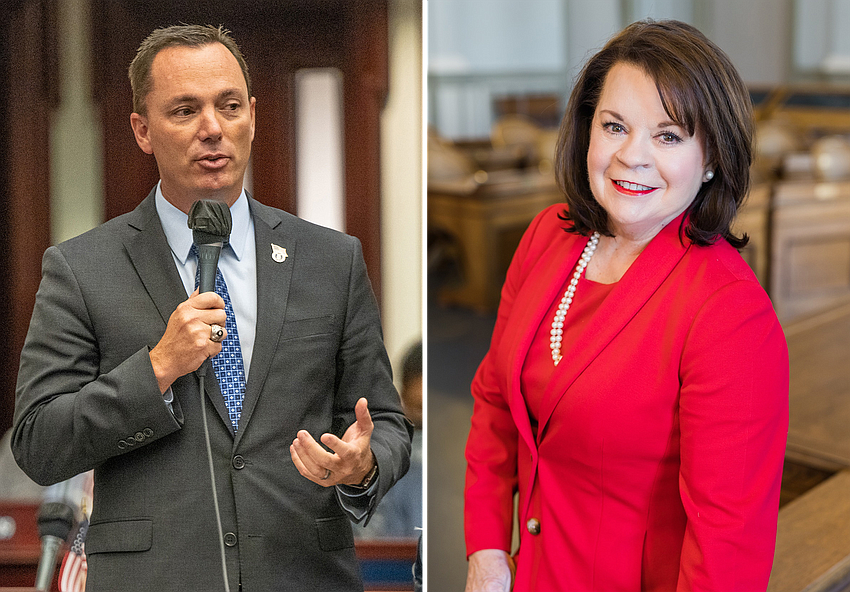- October 22, 2024
-
-
Loading

Loading

A Tampa entrepreneur who sells alternative-wellness gummies and salves could be that rare business case where he has to pack his bags and move his company to another state because of new Florida regulations.
And that entrepreneur, Jonathan Solomon of Tampa-based Proleve, isn't alone. A small army of loosely-aligned hemp and CBD retailers and businesses statewide are bristling at industry reform legislation they say is really an overreaction littered with unintended consequences.
The gist of the legislation, proposed by a pair of Tampa Bay area lawmakers: a limit on the amount of delta-9 THC in hemp extracts. The measure adds to a 2023 rule that made it legal to buy hemp-extracted products only at age 21 and over. The current law also bans packaging attractive to children.
Supporters of the legislation, and its sponsors — Rep. Tommy Gregory, R-Lakewood Ranch and state Sen. Colleen Burton, R-Lakeland — cite safety issues on the use, and marketing, of THC-containing products.
But beyond that, the legislation also has the potential to radically change the connected CBD industry — a prediction both sides of the debate agree on, albeit from disparate perspectives. CBD makers use the cannabis sibling of marijuana — hemp — to extract CBD. But there's enough THC in hemp to draw legal oversight.
The Florida Senate unanimously passed the bill, SB 1698, and a companion version, HB 1613, has been approved by multiple state House committees. Gov. Ron DeSantis indicated he will sign the bill once the House passes it and the Legislature sends the final negotiated bill to his office. So the likelihood of total passage is, for lack of a better word, high. (The law could take effect on Oct. 1.)
Companies and entrepreneurs bellowing the big hand of government and threatening to ditch Florida isn't the norm. It's not the business story the Legislature and Gov. DeSantis usually tell. They say the Sunshine State is the "free state of Florida."
Solomon, for one, says his business of 25 employees, in its 23,000-square-foot Tampa facility, could shutter should the new regulations hit the CBD industry, which needs hemp for the CBD.
Solomon founded Proleve in 2018 knowing there was a market for "alternative wellness" products such as CBD gummies, tinctures and salve. He says he has loyal customers as senior as 94 years old. He made the Business Observer's 40 under 40 in 2020.
While Solomon declined to say what his 2023 revenues were, Proleve issued a statement that its 2020 revenues were $5 million. That was up 178% from $1.8 million in 2019.
"The lawmakers are going to get a big surprise," Solomon says of the bills he projects will "kill" the CBD industry. "The consumers are going to get a big surprise."
Solomon is not alone in his worries. February committee hearings in the Florida Legislature brought out a number of CBD store owners who objected to proposed new rules and ingredient limitations that relate to gummies, salves and oils. Store owners will have to toss out some CBD products altogether if they contain too much of this (hemp's delta-9 THC) or any of that (hemp's rarer delta-8 THC).
Marcus Quinn, CEO of Palmetto-based SunMed-Your CBD Store, a national hemp retailer with 350 locations in 42 states, says in a Feb. 23 news release that the new law could be "industry killing," an unnecessary regulation on low-THC hemp products.
Quinn says the proposals could have economic repercussions and cause people to wonder about Florida's regulatory certainty. A Fort Lauderdale attorney specializing in the industry echoes those concerns, saying there are tints of bias, picking winners and losers, in the proposed legislation.
CBD has been legal in Florida since 2019. CBD makers use hemp for extracting product instead of cannabis sibling marijuana, which has less CBD and more of that other ingredient, tetrahydrocannabinol (THC), the high-inducing, chemical sibling to CBD.
CBD is an alternative-wellness product used for seizure disorders, pain and sleep. To some top researchers, it's not snake oil but it's not a cure-all: "moderate" evidence shows it to be effective, according to Harvard University Medical School. The University of Alabama at Birmingham also found it decreased seizures.
Gregory and Burton say CBD and hemp will not be banned. But the Florida hemp industry, not their reform legislation, is mostly to blame for the fracas, they say.
Gregory tells the Business Observer that some hemp licensees took advantage of state and federal deregulatory laws, passed by various bodies from 2014 to 2019. Florida has hundreds and hundreds of hemp licensees not using their seeds on great swaths of land for legal things like rope, textiles or CBD, he says.

Instead, 83 state licensees are using only 35 acres — not the 20,000 acres lawmakers expected for diverse uses. Much of that hemp is being used to make intoxicating marijuana-like products that contain too much THC, Gregory says.
Gregory explains further: Some of this hemp is being used to make synthetic or rare THC variants — not the normal delta-9 THC used in medical marijuana — and then put in commercial products like gummies. Sometimes producers use foreign-bought additives to make the high more potent, Gregory says.
He and Burton describe a statewide drug problem waiting to happen — a Florida experience no one wants to relive — and say the intent of the hemp laws are being bent. The gray area must be addressed with clear regulation, they say.
"These were not the same products that were part of the conversation," says Burton.
But Solomon and other CBD makers do not want to be involved in this fight. Solomon's Proleve makes and sells gummies and salve products with CBD, legal in Florida because CBD has no or minimal THC.
It's that "minimal" part that has ensnared CBD stores.
CBD products with less than 0.3% of THC are compliant with what lawmakers want. The pair of hemp bills would officially mandate that extracts contain under 0.3% of delta-9 THC. The bills would also ban delta-8 THC and delta-10 THC, a synthetic, as well as a few other things Gregory and Burton say don't belong in extracts.
Gregory, an attorney, has become a bit of an expert on hemp extracts after listening to days and days of doctors testifying about how many milligrams of delta-9 THC are barely noticeable and how many milligrams will get one "high."
And on what kind of variants of THC should be banished. As Gregory spoke to the Business Observer, he browsed through some Florida websites selling CBD and noted one store's gummies with delta-8 THC would be illegal if the law passes.
That's a ban that would affect 10,000 Florida retailers, Quinn says.
Hemp, in Florida and nationwide, has a long history of uses — and regulation.
The U.S. government banned hemp production in 1937. But in 2018, the U.S. Farm Bill "authorized the production of hemp and removed hemp and hemp seeds from the Drug Enforcement Administration's schedule of Controlled Substances," according to the U.S. Department of Agriculture, which was supposed to regulate it.
Gregory says that regulation didn't quite happen, either in Florida or the United States.
Burton says some extracts of Florida's hemp have fallen through federal and state loopholes, producing the type of products that can produce a potent "high." Any hemp extract containing more than 0.3% of delta-9 THC is basically marijuana, she told the Business Observer.
So the bills would add a list of requirements on hemp extract manufacturers and even sellers of CBD. Manufacturers must have lab certificates indicating batches of their extract have 0.3% of delta-9 THC and under. The bill calls for packaging and protection from decay, an expiration date and child-resistance.
That legal definition will complicate things quite a bit for CBD producers, Solomon contends.
"Even if a lab were to test a CBD gummy, there's always a chance of lab error," says Solomon.
Given the relative popularity of CBD, lawmakers can expect fallout if and after the law takes effect, Solomon projects, because scores of CBD makers will simply leave Florida, and stores will shutter.
"The limitations are too strong to stay here," says Solomon.
Yet Burton is firm in her convictions, and doesn't deny some hemp producers like Solomon will feel a pinch, even though the new law has no criminal provisions. Hemp manufacturers will have to adjust, she says, just as they had to adjust after a 2023 law made CBD and hemp-extract products abide by packaging rules that deterred children.
"It will change the market," says Burton. "Nobody denies that."